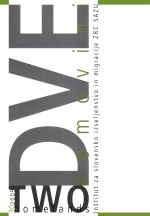Biographical Narrative Interview: Application to Studies of Migration
Keywords:
biographical research method, Fritz Schütze, biographical narrative interview, working alliance, migration researchAbstract
Life stories are relevant for the analysis of social phenomena because they represent the complexity of social action and enable us to re-define concepts on new presuppositions. Life stories therefore need to be analysed, not merely collected and reproduced. This article analyses and critically evaluates the biographical narrative method and the narrative interview. It focuses on practical experiences with the biographical narrative method and reflects upon the working alliance between the researcher and the interviewee, highlighting certain practical dilemmas of this type of research based on actual fieldwork experiences. The article introduces into the Slovene context certain new theoretical and practical reflections on the use of the biographical approach and the method of the biographical narrative interview.
Downloads
References
Apitzsch, Ursula in Lena Inowlocki (2000). Biographical Analysis: A 'German' School? The Turn to Biographical Methods in Social Science (ur. Prue Chamberlayne, Joanna Bornat in Tom Wengraf). London: Routledge, 53–70.
Apitzsch, Ursula in Irini Siouti (2007). Biographical Analysis as an Interdisciplinary Research Perspective in the Field of Migration Studies. The York University Papers in Integrative Research Methods v okviru projekta Research Integration, http://www. york.ac.uk/res/researchintegration/Integrative_Research_Methods/Apitzsch%20Biographical%20Analysis%20April%202007.pdf (9. 9. 2008).
Atkinson, Paul (2005). Qualitative Research – Unity and Diversity. [25 paragraphs] Forum Qualitative Sozialforschung, 6(3), Art. 26, http://nbn-resolving.de/urn:nbn:de:0114- fqs0503261 (20. 10. 2008).
Bauer, Martin (1996). The Narrative Interview: Comments on a Technique for Qualitative Data Collection. Papers in Social Research Methods, Qualitative Series No. 1, LSE: Methodology Institute.
Chamberlayne, Prue, Joanna Bornat in Tom Wengraf (2000).Introduction: The Biographical Turn. The Turn to Biographical Methods in Social Science (ur. Prue Chamberlayne, Joanna Bornat in Tom Wengraf). London: Routledge, 1–30.
Cukut, Sanja (2009). Hotela sem samo videti svet okoli sebe: ženske iz Rusije in Ukrajine v Sloveniji. Krila migracij: po meri življenjskih zgodb (ur. Mirjam Milharčič Hladnik in Jernej Mlekuž). Ljubljana: ZRC SAZU , 193–215.
Cukut, Sanja in Majda Černič Istenič (2007). Needs for Female Immigrants and Their Integration in Ageing Societies. WP2: Interviews with Female Migrants – National Report Slovenia, projekt Femage.Wiesbaden: Federal Institute for Population Research.
Fischer-Rosenthal, Wolfram (2000). Biographical Work and Biographical Structuring in Present-day Societies. The Turn to Biographical Methods in Social Science (ur. Prue Chamberlayne, Joanna Bornat in Tom Wengraf). London: Routledge, 109–125.
Inowlocki, Lena (2007). Manual on the Research Design, interno gradivo projekta FeMiPol. Frankfurt am Main: J. W. Goethe University.
Knoblauch, Hubert, Uwe Flick in Christoph Maeder (2005). Qualitative Methods in Europe: The Variety of Social Research. [10 paragraphs] Forum Qualitative Sozialforschung, 6(3), Art. 34, http://nbn-resolving.de/urn:nbn:de:0114-fqs0503342 (20. 10. 2008).
Lipovec Čebron, Uršula (ur.) (2002). V zoni prebežništva: antropološke raziskave o beguncih v Sloveniji. Ljubljana: Filozofska fakulteta.
Milharčič Hladnik, Mirjam (2005). Subjektivna realnost migracijskih procesov: brati, poslušati in razumeti migrantske izkušnje. Dve domovini, 22: 169–196.
Milharčič Hladnik, Mirjam (2007). Avto/biografičnost narativnosti: metodološko teoretični pristopi v raziskovanju migracijskih izkušenj. Dve domovini, 26: 31–46.
Milharčič Hladnik, Mirjam in Jernej Mlekuž (ur.) (2009). Krila migracij: po meri življenjskih zgodb. Ljubljana: ZRC SAZU.
Mlekuž, Jernej (2006). O metodologiji, ki nagaja »povratniški teoriji«: življenjska pripoved migrantke povratnice. Spet doma? Povratne migracije med politiko, prakso in teorijo (ur. Marina Lukšič-Hacin). Ljubljana: Založba ZRC, 115–132.
Orehovec, Martina (2004). Vmešavanja v življenja drugih: zagate antropološkega raziskovanja na terenu na primeru študije žensk in dela v Istri. Etnolog, 14: 73–92
Pajnik, Mojca (2009). Research Manual: Conducting Lightly Structured Depth Biographical Narrative Interviews, interno gradivo projekta PRIMTS. Ljubljana: Mirovni inštitut.
Pajnik, Mojca, Veronika Bajt in Saša Zupanc (2006). Policies Affecting Female Migrants: Report on Key Informant Interviews in Slovenia. Working paper št. 2, projekt FeMiPol, http://www.femipol.uni-frankfurt.de/docs/working_papers/wp2/Slovenia.pdf (15. 9. 2008).
Pajnik, Mojca, Petra Lesjak-Tušek in Marta Gregorčič (2001). Prebežniki, kdo ste? Ljubljana: Mirovni inštitut.
Peršič, Magda (2004). »Etnologa pa ne« ali »Francke (pa) ni več.« Etnolog, 14: 63–72.
Ramšak, Mojca (2000). Zbiranje življenjskih zgodb v slovenski etnologiji. Etnolog, 10: 29–41.
Rener, Tanja (1993). Biografska metoda in spolna struktura vsakdanjega življenja. Od ženskih študij k feministični teoriji. Časopis za kritiko znanosti, posebna izdaja, 156–163.
Rener, Tanja (1996). Avto/biografije v sociologiji in v ženskih študijah. Teorija in praksa, 33 (5): 759–763.
Riemann, Gerhard (2003). A Joint Project Against the Backdrop of a Research Tradition: An Introduction to »Doing Biographical Research«.[36 paragraphs] Forum Qualitative Sozialforschung, 4 (3), Art. 18, http://nbn-resolving.de/urn:nbn:de:0114-fqs0303185 (19. 10. 2008).
Rosenthal, Gabriele (1993). Reconstruction of Life Stories: Principles of Selection in Generating Stories for Narrative Biographical Interviews. The Narrative Study of Lives, Volume 1 (ur. Ruthellen Josselson in Amia Lieblich). Newbury Park, CA: Sage, 59–91.
Schütze, Fritz (1977). Die Technik des narrativen Interviews in InteraktionsfeldStudien – dargestellt an einem Projekt zur Erforschung von kommunalen Machtstrukturen. Univerza v Bielefeldu: Arbeitsberichte und Forschungsmaterialen, No. 1.
Wengraf, Tom in Prue Chamberlayne (2006). Interviewing for Life-histories, Lived Situations and Personal Experiencing: The Biographic-Narrative Interpretive Method (BNIM). Shortest Short Guide to BNIM Interviewing and Interpretation. Version 6.10a, http://www.uel.ac.uk/cnr/Wengraf06.rtf (12. 7. 2007).
Downloads
Published
How to Cite
Issue
Section
License

This work is licensed under a Creative Commons Attribution-NonCommercial-NoDerivatives 4.0 International License.
Authors guarantee that the work is their own original creation and does not infringe any statutory or common-law copyright or any proprietary right of any third party. In case of claims by third parties, authors commit their self to defend the interests of the publisher, and shall cover any potential costs.
More in: Submission chapter





